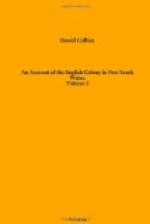The ready sale which the speculators who called here constantly found for their cargoes, together with the ruinous traffic which was carried on by means of the monopolies that existed in opposition to every order and endeavour to prevent them, would, beyond a doubt, without the establishment of a public store on the part of government, keep the settlers and others in a continual state of beggary, and extremely retard the progressive improvement of the colony.
On the 18th arrived the Britannia whaler from England, with 94 female convicts, who were forthwith landed, and some of them were sent to Parramatta and Toongabbie. The cattle that were brought in the Hunter, and which were sold by auction at this time, were not greater objects of contest than were these females, the number of women in the settlements bearing no proportion to the men.
The Reliance and Francis schooner, which had been sent to Norfolk Island at the latter end of May, returned the 25th and 27th of this month, having been absent on that service about 60 days, 27 of which were taken up by the Reliance on her passage back, she meeting with blowing weather and much sea the whole way.
By her, the officer commanding on the island wrote, that a most improper association had been entered into by the settlers and others which they termed the Fraternal Society of Norfolk Island; and which, among others, had for its object the uniting for the purpose of distressing the government, by withholding the produce of their farms from the store; in consequence of some misconduct on the part of the store-keepers, who suffered the same monopoly to take place there, as was complained of in New South Wales. They wrote at the same time to the governor, positively denying their giving any name to their meeting but heavily complaining; that, after much expense and trouble in rearing swine, the store-keepers would not receive it.
The governor highly censured this manner of assembling, and, in a printed notice which he sent thither, pointed out to the inhabitants, that if they felt themselves labouring under any grievance real or supposed, they were to submit their complaints respectfully to the officer in the direction of the settlement, by one or two persons chosen for that purpose, and not by a numerous body of people. Every other mode of procuring redress was highly illegal, and could only tend to expose those who might be concerned to a very considerable degree of danger.
It was necessary to assemble the court of criminal judicature once in this month for the trial of an incorrigible offender, John Raynor. who was convicted of house-breaking, and whose fate had been often merited and long predicted. He left a letter, previous to his execution, in which he enumerated the many offences that he had committed, and denied several with which he had been charged.




